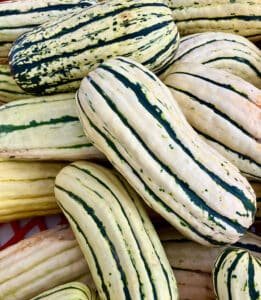By Anne Palumbo
 When I discovered delicata squash a few years ago, I couldn’t stop talking about it. I still can’t! The taste, the texture, the nutrition, the delicate skin…oh, if only it were available year-round.
When I discovered delicata squash a few years ago, I couldn’t stop talking about it. I still can’t! The taste, the texture, the nutrition, the delicate skin…oh, if only it were available year-round.
The good news is, they’re in season now through November. And the even better news is, they can be stored safely for about two to three months in a cool, dry place.
But here’s the best news of all about this striped, pleasantly sweet winter squash: it’s chock full of nutrition, particularly vitamins C and A — two vitamins that boost immune system health. Right now, with flu and cold season bearing down on us, bolstering this all-important system seems wise.
Like other winter squashes, delicata is super low in fat, sodium, cholesterol and calories (only 40 per cup). And while it may have more carbs than some vegetables (10 grams per cup), it is by no means a carb-watcher’s nightmare. As a comparison: 1 cup green beans (7 grams), 1 cup corn (27 grams), 1 medium potato (35 grams), and — okay, this is not a vegetable but I couldn’t resist — 1 soft pretzel (80 grams).
Delicata’s natural carbs are “complex” and take longer to digest, versus the “refined” carbs found in processed foods, such as sugary drinks, pastries, white bread, most snacks, and many cereals. The good fiber-rich carbs in delicata squash provide longer-lasting energy, more stable blood sugars, and fiber-driven heart protection. The bad fiber-depleted carbs in most processed foods, on the other hand, tend to cause spikes in blood sugar levels, which can trigger hunger and lead to food cravings. Numerous studies support that excessive refined-carb consumption may pave the way for health problems, such as obesity, Type 2 diabetes, and heart disease.
Unlike other hard-skin winter squash, delicata’s skin is edible, adding a nutty deliciousness to an already yummy squash. But that’s not all it adds: its skin is also rich in fiber, vitamins, minerals, and antioxidants. Antioxidants are beneficial molecules that fight free radicals, which, when elevated in your body, have been linked to heart disease, cancer, and other diseases.
Parmesan-Crusted Roasted Delicata Squash
 Serves 4
Serves 4
1 delicata squash, washed and dried
1 tablespoon olive oil
¼ teaspoon kosher salt
coarse black pepper, to taste
¼ cup grated parmesan cheese
¼ cup whole-wheat panko breadcrumbs
1 teaspoon dried thyme
1 garlic clove, minced
1 teaspoon lemon zest (optional)
1. Preheat oven to 425° F. Line a large baking sheet with parchment paper; set aside.
2. Trim the ends off the delicata squash, then slice the squash in half lengthwise and scoop out the seeds. Slice the seeded halves into ½-inch thick slices (half circles) and place them in a large bowl.
3. Drizzle the olive oil, salt, and pepper over the squash slices, tossing well to coat. Transfer to the prepared baking sheet, arranging the slices in an even, flat layer.
4. In a small bowl, combine the parmesan, breadcrumbs, thyme, garlic, and lemon zest.
5. Sprinkle the parmesan mixture over the squash, pressing to adhere.
Roast in the center of the oven until tender and golden brown, about 25 minutes.
Helpful Tips
Select blemish-free squashes that feel heavy and firm, especially near the stem ends. Delicata’s thin, easy-to-slice skin does not need to be peeled before cooking. Also, this squash holds its shape during cooking, making it an excellent choice for stuffing and baking. As mentioned, whole delicata keep for several months if stored in a cool, dry place.

